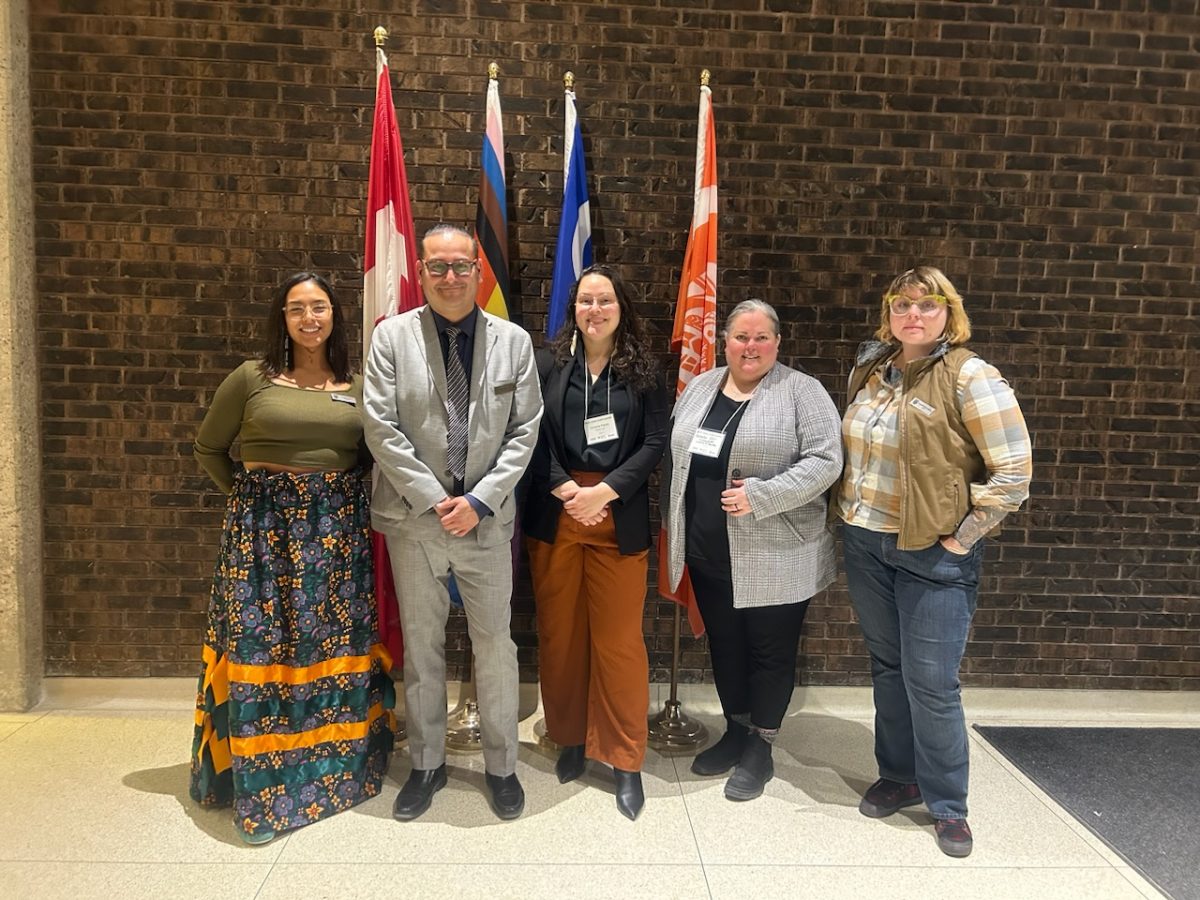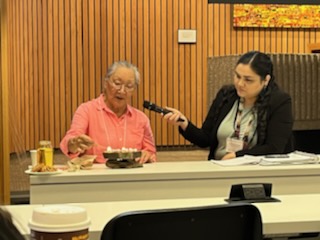
Left to right: Janell Jackson (2L); Marc Kruse, Director of Indigenous Legal Learning and Services; Victoria Perrie, practicing lawyer at Perrie Law and lead of the Inuit Justice Clinic project, Natasha Ellis (3L), Research Articling Student, Cody-Wyoming Lockhart (3L).
Inuit Legal Clinic Summit at Robson Hall
Gathering assesses legal issues for potential Winnipeg-based clinic
The Faculty of Law and Perrie Law, with funding from the Manitoba Law Foundation, hosted a gathering of stakeholders on May 1 – 2 attending an Inuit Legal Clinic Summit. The purpose of the summit was to listen to community experiences with cross-jurisdictional legal issues and to determine the viability of an Inuit Legal Clinic in Winnipeg.
The Summit was a collaboration between the Faculty of Law’s Director of Indigenous Legal Learning and Services, Marc Kruse [JD/2015] and Perrie Law principal Victoria Perrie [JD/2018], a Métis-Cree criminal defence lawyer whose practice serves Inuit communities in Nunavut and focuses on providing services to Indigenous clients in Manitoba.
The idea for the Summit came about as a result of Perrie’s time working with Inuit in the North. Since 2019 Perrie has practiced criminal defence in Nunavut and throughout that time took note of an often-overlooked issue: when Nunavummiut experience a legal issue outside of the Territory, they face unique barriers with access to justice. She assisted clients with connections to counsel as she was able, but after nearly five years of seeing the same issues pop up across practice areas, she felt it was time to take action and gather the community to discuss this phenomenon and determine the best course of action to assist folks with these issues.
As a non-Inuk, it was important for me to bring the community together and hear from Inuit and organizations who serve Inuit on this issue and whether a clinic was needed. Overwhelmingly, the community response was yes – an independent clinic is wanted and needed. – Victoria Perrie [JD/2015], Perrie Law
“It was important to me for this Summit to be organized because I was not seeing this issue tackled by any other body,” said Perrie. “I reached out to the organizations that serve Inuit in Nunavut and Manitoba and learned there were little to no legal service providers focused on serving Inuit experiencing a cross-jurisdictional legal issue or able to assist a client with legal issues in both jurisdictions. Of particular concern were folks who fall between the cracks: for example, someone who would qualify for Legal Aid in Nunavut, but would not qualify in Manitoba. As a non-Inuk, it was important for me to bring the community together and hear from Inuit and organizations who serve Inuit on this issue and whether a clinic was needed. Overwhelmingly, the community response was yes – an independent clinic is wanted and needed.”
As Director of Indigenous Legal Learning and Services, Marc Kruse, tries to bring the resources of the Faculty of Law to support Indigenous legal projects. “By hosting the event at Robson Hall, we were able to provide in-kind support of our space, tech, and admin staff,” said Kruse. “More importantly we were able to have several Indigenous law students participate in the Summit. Inuit legal orders and issues impacting Nunavut are lacking in our curriculum so this summit was a great introduction for the Director and students to Nunavut Indigenous Legal Orders.”
Attendees included community members from Manitoba and Nunavut who answered the organizers’ requests for consultations. Community organizations represented included the following:
MP Lori Idlout office
The Law Society of Manitoba
University of Manitoba – Faculty of Law / University of Manitoba Community Law Centre
Catriona Dooley Law Office
Kivalliq Legal Services
Manitoba Justice
RCMP Indigenous Policing Services
Kivalliq Legal Services Board- President
Manitoba NDP
Manitoba Law Foundation
Nunavut Law Foundation
Manitoba Advocate for Youth
Manitoba Human Rights Commission
Legal Aid Manitoba
University of Manitoba
Legal Aid Manitoba
Lafleur & Associates
Wolson Roitenberg Robinson Wolson Minuk Law
Law Society of Nunavut
Manitoba Inuit Association
Tunngasugit Inc
Public Prosecution Service of Canada
Piqqusilirivvik
Nunavut Legal Services
Nunavut Legal Services Board
As well, several esteemed elders attended from Manitoba and the Kivalliq region of Nunavut, whose input guided the conversations and Summit direction.
In keeping with Inuit community gathering traditions, a Qulliq (an Inuit Lamp) was lit at the start of the summit and kept burning throughout the meeting by a designated Fire Keeper, Elder Martha Peet, originally from Taloyoak Nunavut, but now residing in Treaty 1 Territory, National homeland of the Red River Métis.
The Qulliq represents multiple aspects important to Inuit culture and as such, is integral in the Truth-Gathering Process at events such as this Summit. Fire provides heat, light, cooks food, melts ice and boils water, and dries wet clothes.

Elder Martha Peet lights the Qulliq for the May 1 – 2 Summit while Facilitator Catriona Dooley assists.
The Summit involved several panel discussions where stakeholders set out their areas of need as they related to existing community legal needs, followed by breakout sessions to allow for discussion and brainstorming of how those needs could be addressed. A session on Inuit Qaujimajatuqangit (also known as Inuit Traditional Knowledge, or IQ) and Inuit Law Learning helped familiarize participants with traditional Inuit ways of being and knowing. The Summit’s second day included several panel discussions on available resources, adjacent service providers and post sentence needs of community members involved with the legal system.
The conversations, learning and discussions held at the Summit were taken note of for incorporation into a final report to be published later this summer in order to help determine what shape an Inuit Legal Clinic will take to ensure access to justice for Inuit in Manitoba.
Organizers Marc Kruse and Victoria Perrie firmly believe the clinic should be Inuit operated, and that next steps should be guided by the wisdom of the Elders who brought their knowledge to and participated in the Summit. The Faculty of Law will provide student volunteers to any resulting clinic and provide mentorship on IQ principles.
The Summit was made possible with funding from the Manitoba Law Foundation, Perrie Law, and the Faculty of Law, University of Manitoba.
The organizers extend special thanks to:
- Tara Tootoo Fotheringham for her guidance and contributions to the planning of the Summit
- The Office of MP Lori Idlout for their participation
- Sarah Arngna’naaq for her contributions to the development of the Summit Agenda and her presentation on IQ use in a justice setting
- Marie Josée Lafleur for her presentation grounding the need for the clinic in the every day realities that Inuit face when attempting to access cross-jurisdictional legal assistance






